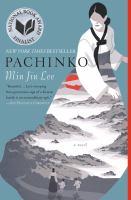
International historical fiction is not my typical genre, but Min Jin Lee’s Pachinko swept me off my feet. This epic Korean family story starts in the late 1800’s and spans all the way to the late 1980’s. The unifying thread of the tale is Sunja, a resourceful and headstrong woman who has to repeatedly prove her convictions and loyalties through life’s many tests.
Born to a disabled father in Korea, society held low expectations for Sunja. As a teenager, she finds herself falling for the genuine affection of an older, well-off Japanese businessman who she thinks intends to marry her. When she tells him she’s pregnant, he reveals that he’s married but wants to care for her nonetheless, Sunja rejects his offer for the sake of her own dignity. Instead, she marries a young priest who she’d helped nurse back to health, with him knowingly embracing her unborn child as his own. Sunja and her new family move to Japan, where her path continues to intersect with her former lover who can’t relinquish his position as her son’s father.
This is a slow-burn kind of read, lacking a climactic story arc; the evolution of life itself is drama enough. Min Jin Lee does a fabulous job of illuminating the hardships for a Korean woman trying to make her way in the unwelcoming climate of pre- and post-WWII Japan. An incredible ensemble cast of characters weave their way in and out of the pages. Bit parts are given tender spotlights before their moment in the sun fades into the next scene change. The reader is kept engaged through the 600+ pages by the beautiful prose and descriptive details that Min Jin Lee is becoming known for.
Cliché though it may be to say it, Pachinko is an instant classic, a natural fit for book clubs, and the perfect book to let yourself get lost in when you have time to enjoy the long, poignant journey.
If you enjoy this book, you might also try The Last Hundred Years trilogy by Jane Smiley, starting with Some Luck. Both Pachinko and Smiley’s trilogy are family sagas that follow a core group of characters over a century of changes, historical events, and the dramatic and poignant ups and downs of life. If it’s the novelized historical look at Korea that pulls you into Pachinko, you might also enjoy The Island of Sea Women by Lisa See. A consummate storyteller of Asian heritage, Lisa See never fails to hit the mark with readers.
